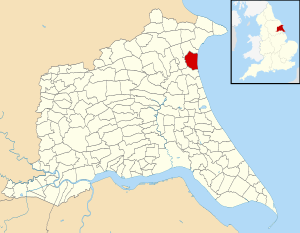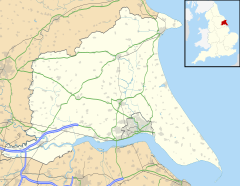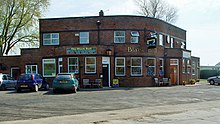Human settlement in England
| Barmston | |
|---|---|
 All Saints church, Barmston All Saints church, Barmston | |
 | |
 | |
| Population | 275 (2011 census) |
| OS grid reference | TA163591 |
| • London | 170 mi (270 km) S |
| Civil parish |
|
| Unitary authority | |
| Ceremonial county | |
| Region | |
| Country | England |
| Sovereign state | United Kingdom |
| Post town | DRIFFIELD |
| Postcode district | YO25 |
| Dialling code | 01262 |
| Police | Humberside |
| Fire | Humberside |
| Ambulance | Yorkshire |
| UK Parliament | |
| 54°00′55″N 0°13′31″W / 54.015247°N 0.225280°W / 54.015247; -0.225280 | |
Barmston is a village and civil parish in the East Riding of Yorkshire, England. It is situated on the Holderness coast, overlooking the North Sea and to the east of the A165 road. Barmston is approximately 6 miles (10 km) south of Bridlington town centre. The parish includes the village of Fraisthorpe, the former villages of Auburn and Hartburn have been abandoned due to coastal erosion. Barmston is mentioned in the Domesday Book as having eight ploughlands and belonging to Drogo of la Beuvrière. The name of the village derives from Beorn's Tūn (Beorn's Town). According to the 2011 UK census, Barmston and Fraisthorpe parish had a population of 275, a slight decrease on the 2001 UK census figure of 277. The parish covering an area of 1,765.014 hectares (4,361.44 acres).
The beach at Barmston was awarded the Blue flag rural beach award in 2005, but was removed from the list of designated bathing beaches in 2010, as a result of erosion making access to the beach difficult.
The parish church of All Saints is a Grade I listed building. Barmston public house is the Black Bull. The Old Hall was designated a Grade II* listed building in 1952 and is now recorded in the National Heritage List for England, maintained by Historic England.


A key industry in the village is tourism and there is a caravan park located on former agricultural land near the beach. The cliffs are made of soft marl clay and are subject to erosion. Numerous properties have been demolished over the years to prevent them from falling into the sea. The position of a road leading down to the beach (long since lost to the sea) is clearly visible. The road still exists to the clifftop, which is blocked off by a barrier, and the rocks that supported the slope are still visible at low tide, giving an indication of how far the cliff has eroded. The coast road was completely lost to the sea by 1996. Barmston is one of the worst locations in England for coastal erosion; in 1967, 20 feet (6 m) of coastline was lost over just two days due to storms in October. The rate of erosion varies from year to year and is down to the tides and which way the winds are blowing, but typically the amount is between 4 feet (1.2 m) and 8 feet 2 inches (2.5 m) per year.
Barmston is the proposed landfall site for a carbon capture and storage scheme linking the proposed Don Valley Power Project at Stainforth, near Hatfield in South Yorkshire and the White Rose CCS project at Drax Power Station in North Yorkshire with porous rock beneath the North Sea.
Geography
The civil parish is almost completely low lying agricultural land with several farmsteads; excluding the Holderness coast and the two villages of Barmston and Fraisthorpe. the high point is 85 feet (26 m) at Hamilton Hill, which is a triangulation point. The A165 Bridlington Road passes through the parish.
History
The village of Barmston gave its name to the ancient parish and ecclesiastical parishes of Barmston. The parish was bounded by watercourses of Earl's Dike (also known as Watermill Grounds Beck) to the north, and Barmston drain to the south. In 1935 the civil parish was substantially enlarged with the addition of most of the parish of Fraisthorpe to the north, an increase of 1,995 acres (807 ha). Although the current civil parish is called "Barmston" its parish council is called "Barmston and Fraisthorpe Parish Council".
The village of Hartburn on the Holderness coast was deserted after the 15th century and no longer exists due to coastal erosion. The village was located just south of the outflow of Earl's Dike on the coastline.
The hamlet of Winkton in the parish of Barmston had also been long abandoned by the 1850s.
The village of Auburn in the former parish of Fraisthorpe was abandoned to coastal erosion, except for a farm; the chapel was dismantled in the 1780s.
Notable people
- William Dade, was vicar of the parish of Barmston between 1766 and 1790
References
- ^ UK Census (2011). "Local Area Report – Barmston Parish (1170211138)". Nomis. Office for National Statistics. Retrieved 14 February 2018.
- "Barmston | Domesday Book". opendomesday.org. Retrieved 29 April 2020.
- Ekwall, Eilert (1960). The concise Oxford dictionary of English place-names (4 ed.). Oxford: Oxford University Press. p. 27. ISBN 0-19-869103-3.
- UK Census (2001). "Local Area Report – Barmston Parish (1543504185)". Nomis. Office for National Statistics. Retrieved 24 November 2018.
- "2001 Census Area Profile" (PDF). East Riding of Yorkshire Council. 2004. Archived from the original (PDF) on 18 March 2012. Retrieved 8 February 2013.
- "Toast to our coast". infoweb.newsbank.com. 9 November 2005. Retrieved 29 April 2020.
- "Bathing water results for England unveiled". Environment Agency. 15 November 2010. Retrieved 10 April 2015.
- "Making a splash". infoweb.newsbank.com. 14 November 2008. Retrieved 29 April 2020.
- Historic England. "Church of All Saints (1083851)". National Heritage List for England. Retrieved 13 August 2013.
- Historic England. "Old Hall (1204832)". National Heritage List for England. Retrieved 19 August 2013.
- "Owners need to demolish homes". infoweb.newsbank.com. 12 April 2004. Retrieved 29 April 2020.
- "North division: Barmston | British History Online". www.british-history.ac.uk. Retrieved 29 April 2020.
- "Holderness Coast (United Kingdom)" (PDF). copranet.projects.eucc-d.de. p. 5. Retrieved 29 April 2020.
- "Erosion's a beach". infoweb.newsbank.com. 24 April 2008. Retrieved 29 April 2020.
- "Villagers with worst coast erosion in Europe fear being swallowed by sea". infoweb.newsbank.com. 12 January 2008. Retrieved 29 April 2020.
- "Samsung backs £5bn Hatfield carbon-capture project". BBC News. BBC. 28 March 2012. Retrieved 19 June 2012.
- "New public exhibitions for Yorkshire carbon dioxide pipe". BBC News. BBC. 19 June 2012. Retrieved 19 June 2012.
- "Local residents to have their say on CCS project". National Grid. 18 June 2012. Archived from the original on 20 December 2014. Retrieved 19 June 2012.
- "Welcome to the website for the National Grid Yorkshire and Humber carbon capture, transportation and storage (CCS) project". National Grid. Retrieved 19 June 2012.
- Ordnance Survey, 2007, 1:25,000
- ^ "Barmston EP through time : Administrative history of Ecclesiastical Parish: hierarchies, boundaries". A Vision of Britain Through Time. University of Portsmouth. 2009. Archived from the original on 24 December 2012. Retrieved 2 February 2013.
- "Fraisthorpe With Auburn and Wilsthorpe CP through time : Administrative history of Parish-level Unit: hierarchies, boundaries". A Vision of Britain Through Time. University of Portsmouth. 2009. Archived from the original on 24 December 2012. Retrieved 2 February 2013.
- "Barmston". Ordnance Survey. Retrieved 8 February 2021.
- "An overview of our parish". Barmston and Fraisthorpe Parish Council. Retrieved 8 February 2021.
- Allison, K. J.; Baggs, A. P.; Cooper, T. N.; Davidson-Cragoe, C.; Walker, J. (2002). "North division: Barmston". In Kent, G.H.R. (ed.). A History of the County of York East Riding: Volume 7: Holderness Wapentake, Middle and North Divisions. pp. 213–223. Retrieved 13 August 2011.
- Ordnance Survey, 1854, 1:10,560
- Sheahan, J. J.; Whellan, T. (1857). "History of Holderness : Barmston". History and topography of the City of York, the East Riding of Yorkshire ... Vol. 2. pp. 401–402.
- Sheahan, J. J.; Whellan, T. (1857). "Dickering Wapentake : Auburn". History and topography of the City of York, the East Riding of Yorkshire ... Vol. 2. p. 463.
- Pevsner, Nikolaus (2002). Yorkshire : York and the East Riding (2 ed.). London: Yale University Press. p. 273. ISBN 0300095937.
- Gazetteer — A–Z of Towns Villages and Hamlets. East Riding of Yorkshire Council. 2006. p. 3.
Maps
- 54°01′32″N 0°13′34″W / 54.025547°N 0.225979°W / 54.025547; -0.225979 Hamilton Hill
- 54°02′44″N 0°13′05″W / 54.0456081°N 0.2181752°W / 54.0456081; -0.2181752 Site of the medieval village of Auburn
Sources
- Gazetteer — A–Z of Towns Villages and Hamlets. East Riding of Yorkshire Council. 2006. pp. 3, 6.
- Sheahan, J. J.; Whellan, T. (1857). History and topography of the City of York, the East Riding of Yorkshire, and a portion of the West Riding: embracing a general review of the early history of Great Britain, and a general history and description of the county of York. Vol. 2. John Green (Beverley) (printer).
External links
- [REDACTED] Media related to Barmston at Wikimedia Commons
- Historic England. "All Saint's Church (1083851)". National Heritage List for England.
- Barmston in the Domesday Book
- Barmston in Welcome to Yorkshire
| Yorkshire Portal | |
| Statutory City Region | Hull and East Yorkshire Combined Authority |
| Unitary authorities | |
| Major settlements (cities in italics) | |
| Rivers | |
| Canals | |
| Topics | |
| Populated coastal places in the East Riding of Yorkshire | ||||
|---|---|---|---|---|
| ||||